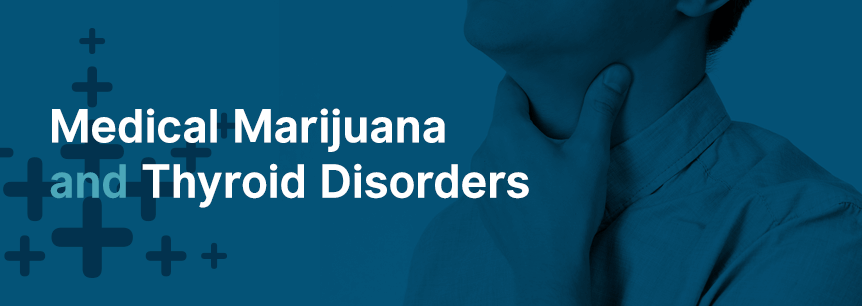
The symptoms of a thyroid disorder — including fatigue, sleep problems, anxiety, and depression — can take a toll on your quality of life. Thyroid disorders are relatively common, as about 20 million people in the U.S. have them in some form. Fortunately, you have treatment options, including medical cannabis for thyroid disorders, that can help ease these symptoms so you can go back to feeling more like yourself again.
When your thyroid is overactive or underactive, you can experience many symptoms, since the gland plays such an integral role in regulating your body. Cannabinoids have pain-relieving, anxiety reducing, anti-inflammatory properties and more that help significantly in managing the symptoms of thyroid disorders.
Find A Doctor Find A Dispensary
Medical marijuana for thyroid disorders can treat a multitude of these symptoms, such as:
1. Pain — Medical weed can help relieve pain associated with Graves’ disease. Conventional therapies often lead to painful side effects like joint pain. Research shows cannabis reduces pain levels significantly.
Numerous strains of the cannabis plant can reduce pain and discomfort considerably. Indica strains seem to help alleviate pain better than hybrids and Sativas, according to patients. Some Indica strains to try to reduce your symptoms of pain include:
That doesn’t mean Sativas and hybrids don’t work for pain. You might want to try out these alternative strains, which have also helped many patients find relief:
2. Inflammation: Certain thyroid disorders, like thyroiditis, cause inflammation of the thyroid gland. Cannabis is very effective at reducing inflammation. The cannabinoids in cannabis work like anti-inflammatory drugs. Try these strains to help reduce your symptoms of inflammation:

3. Weight loss: We all know how marijuana gives you the “munchies.” If you’re struggling with weight loss due to your thyroid disorder, cannabis can help. Some strains to try include:
4. Anxiety and depression: Some patients struggle with anxiety and depression, which also impact their quality of life. For these individuals, the following strains can help:
5. Thyroid hormone balance: Research shows cannabinoids in marijuana for thyroid disorders play a significant role in hyperthyroidism treatment by regulating your body’s balanced energies, especially in your endocrine system. Medical marijuana’s cannabinoids respond well to the natural, innate cannabinoid substances in your body. Hyperthyroidism is an imbalance in your body’s normal functioning. CBD helps maintain and balance the body’s homeostasis.
Some strains that may help with this are:
Likewise, the European Journal of Endocrinology published a study in 2002 showcasing evidence of functional thyroid CB receptors in rats being able to modify the release of both T3 and T4 hormones. According to the study, a 30 percent hormone release decrease occurred within four hours of administering CBD.
6. Nausea and vomiting: There have been plenty of studies and anecdotal evidence that cannabis helps treat nausea and vomiting. Some strains to try include:
7. Fatigue: Sativa strains can help with fatigue because they’re energizing and stimulating. Some of the best strains, however, include:
There are nearly endless cannabis strains, and each has different effects. Smoking marijuana for thyroid disorders might not be the best choice of delivery method, since it could harm your lungs. Fortunately, smoking is not your only option. There are healthier choices for receiving your cannabis treatment, including vaping, edibles, topicals, tinctures, CBD oils and more. Many people like the convenience of vaping, while others prefer edibles.
Keep in mind, that cannabis can have some side effects, including hunger, drowsiness, red eyes, dry mouth, thirst, and short-term memory loss.
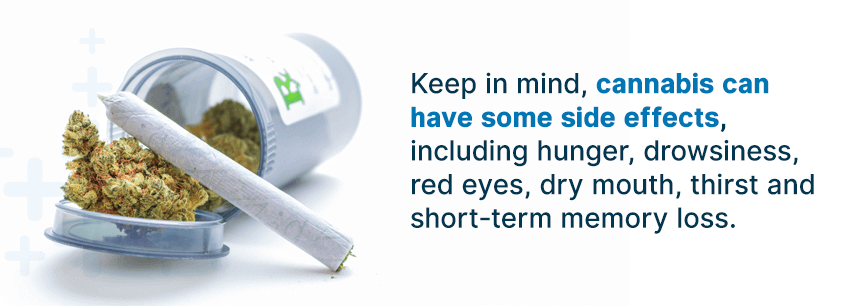
Not all states have legalized cannabis. However, many have passed laws that allow the medicinal use of the herb. Be sure you check your state’s laws to see if you qualify for cannabis for thyroid disorders. If so, book your appointment here at Marijuana Doctors to find a cannabis doctor to provide you with your recommendation so you can get started on treatment as soon as possible and begin improving your life.
Find A Doctor Find A Dispensary
Thyroid disorders are conditions affecting your thyroid gland, which is responsible for regulating multiple metabolic processes throughout your body. The thyroid is a butterfly-shaped gland that wraps around your windpipe in the front of your neck.
Your thyroid produces vital hormones using iodine. The primary hormone the gland produces is thyroxine (T4). The gland releases a small portion of T4, which converts to the most active hormone, triiodothyronine (T3).
A feedback mechanism that involves the brain regulates the thyroid gland’s function. Various types of thyroid disorders affect either its purpose or structure. When you have low thyroid hormone levels, for example, your brain’s hypothalamus produces a thyrotropin-releasing hormone.
That causes your pituitary gland to release a thyroid-stimulating hormone. Then, the TSH stimulates your thyroid gland to release more of the T4.
Because your hypothalamus and pituitary gland control your thyroid gland, disorders of these tissues may also affect the function of your thyroid, causing thyroid problems.
There are numerous types of thyroid disorders. Six common types are:
With hyperthyroidism, your thyroid gland is overactive, producing too much of its hormone. Hyperthyroidism impacts about 1 percent of women.
Hyperthyroid symptoms may include:
Women are up to 10 times more likely to develop hyperthyroidism than men.
Hypothyroidism is the opposite of hyperthyroidism. It’s underactive and can’t make enough of its hormone. Nearly 5 percent of people over 12 years old in the U.S. have hypothyroidism, though the condition is usually mild.
Hypothyroidism symptoms may include:
Hypothyroidism can cause a health problem called myxedema coma if left untreated for long periods of time. Myxedema coma is a potentially fatal but rare condition requiring immediate hormone treatment.
Also called chronic lymphocytic thyroiditis, Hashimoto’s disease is the most common cause of hypothyroidism. It affects around 14 million Americans. While anyone of any age can develop it, it typically affects middle-aged women. Hashimoto’s disease occurs when your immune system mistakenly attacks your thyroid gland, eventually destroying it and its ability to produce hormones.
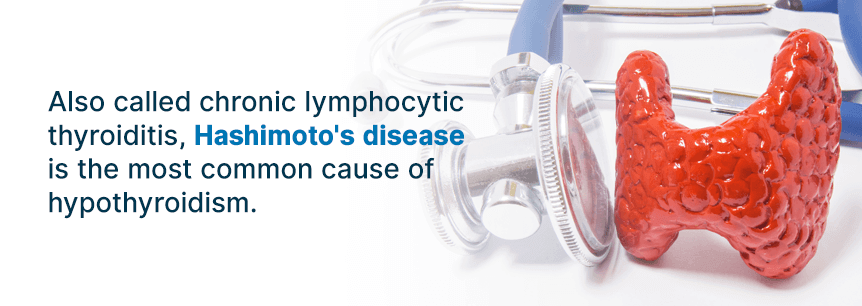
Symptoms of Hashimoto’s disease may include:
Graves’ disease commonly causes hyperthyroidism and affects around one in 200 individuals in the U.S.
It’s an autoimmune disorder that also occurs when your immune system attacks your thyroid gland by mistake. When this happens, it can cause your thyroid gland to overproduce the hormone that regulates metabolism.
Symptoms of Graves’ disease may include:
Goiter is a benign enlargement of your thyroid gland. Iodine deficiency is a common cause of goiter. Estimates show it affects around 200 million of the 800 million individuals who have an iodine deficiency worldwide.
If it grows big enough, a goiter could cause specific symptoms such as:
Thyroid nodules are a type of growth that forms in or on your thyroid gland. Around 1 percent of men and 5 percent of women have thyroid nodules big enough to feel. Approximately 50 percent of individuals will develop nodules too tiny to detect without an X-ray or another scan.
Some thyroid nodules make thyroid hormone that causes irregularly high levels of the hormone in the bloodstream. When this occurs, the symptoms you may experience are similar to those of hyperthyroidism and may include:
If the thyroid nodules are the result of Hashimoto’s disease, the symptoms you may experience are similar to those of hypothyroidism and may include:
Thyroid disorders typical result in either too much thyroid hormone, as is the case with hyperthyroidism, or too little thyroid hormone, as with hypothyroidism.
Thyroid hormone overproduction involves all forms of hyperthyroidism, but the disorder could occur in a few other ways, such as:
Hypothyroidism occurs when the body fails to produce enough thyroid hormones. Because the energy production of your body needs certain amounts of thyroid hormones, a decrease in hormone production results in lower energy levels.
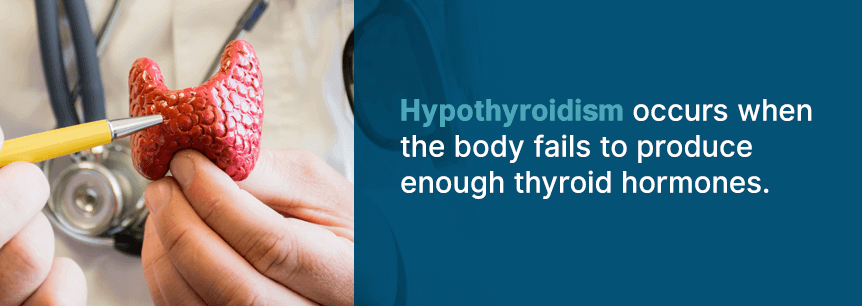
Hypothyroidism can occur due to:
If you have an untreated or improperly treated thyroid condition, you could suffer serious health problems.
An overactive thyroid can cause numerous problems like:
An underactive thyroid can lead to a range of complications like:
A thyroid disorder can also affect your mood, mainly causing either depression or anxiety. Typically, the more severe your thyroid disorder is, the more severe your mood changes will be.
If you have hyperthyroidism, you could experience restlessness, unusual nervousness, irritability and anxiety.
If you have hypothyroidism, you could experience mild to severe fatigue and depression.
Treatment that works by blocking your body’s ability to produce new thyroid hormone or one that replaces missing thyroid hormone typically helps improve both physical and mental symptoms thyroid disorders can cause.
In 1656, Thomas Wharton coined the term “thyroid.” Graves’ disease takes its name from Robert Graves, a doctor in Ireland who diagnosed a case of goiter with bulging eyes in 1835. Charles H. Mayo introduced the term “hyperthyroidism” in 1910. Finally, in 2004, researchers linked neurological and thyroid abnormalities with the monocarboxylate transporter gene.
Medication and sometimes surgery can treat thyroid disorders. The treatment you receive will depend on which thyroid disease you have.
The doctor may give you medication if you have hypothyroidism to replace the missing thyroid hormone. They may provide you with synthetic thyroid hormone you take orally in pill form. If you have hyperthyroidism, medicines can help decrease thyroid hormone production or keep it from releasing from the gland.
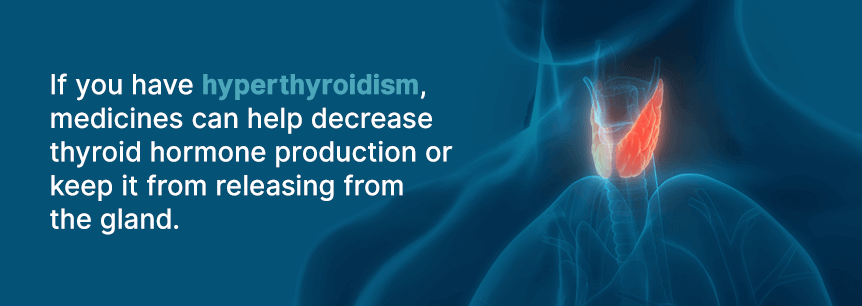
Side effects of synthetic thyroid hormone pills include:
Your doctor may also prescribe you medicine to help manage hyperthyroidism symptoms, such as an increased heart rate. If medications can’t control hyperthyroidism, the doctor may perform radioactive ablation, where they provide you with iodine doses labeled with radioactivity to destroy thyroid tissue selectively.
The doctor may recommend surgery to remove a hyperfunctioning nodule or large goiter in the gland. Surgery is necessary if the doctor suspects you have thyroid cancer. If the surgeon can’t remove the thyroid gland entirely, you’ll need to take synthetic thyroid hormone for the rest of your life. The doctor may also recommend surgery for Graves’ disease, which was the preferred treatment before the introduction of anti-thyroid medicines and RAI therapy. However, this surgery is not very common anymore.
Over the past 10 years, there have been advances in the field of autoimmune thyroid disease (AITD) concerning the available therapeutic and diagnostic techniques, along with the clinical consensus. The modernized clinical guidelines enable doctors to identify the most current and reasonable methods to manage thyroid disease properly.
Issues with ongoing discussions include:
More studies and research on pathophysiologic mechanisms, as well as AITD genetic backgrounds, will assist in developing individualized and definite therapeutic techniques for autoimmune thyroid disease.